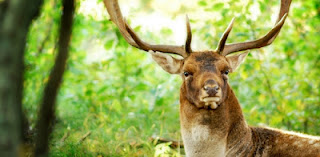I like to
go to the Amsterdamse Waterleidingsduinen, a nature reserve in the Netherlands
The photo
above is an example, the deer is quite dominant in this photo, but the photo
isn’t interesting at all. There’s nothing happening, and you can’t see where he’s
looking at. This photo is taken with a 300mm, and I regret doing so. (although
if I’m honest, I don’t think this photo would have improved if I took it with
another focal length)
This photo
is taken with a 135mm at f/4, and you can still see a lot of the deer’s
surroundings. It makes a more interesting photo because I included more of the
surroundings. You can see where he’s going, and you can see that the area wasn’t
very open. And to be honest the light is better than in the previous photo.
Now, I did
not mean that I’m trying to make photos with the shortest focal length possible.
I think there is definitely a place for telephoto lenses. For example this
shot, is taken with my 300mm, but I was much closer to this deer than I was
with the first photo. This is more of a headshot, and I think, also makes an
interesting photo.
The point I’m
trying to make, is that you don’t necessarily need to go for your longest lens,
or totally zoom in your zoom lens. When you can’t get close enough, it doesn’t
improve your photo. Sometimes it is better to use a shorter focal length, and
show the animal in its surroundings. Think more about your actual composition,
and try not to be locked into the idea I need to get as close as possible.





Hoi Koen
BeantwoordenVerwijderengeweldige serie van die herten.
groetjes Herman.